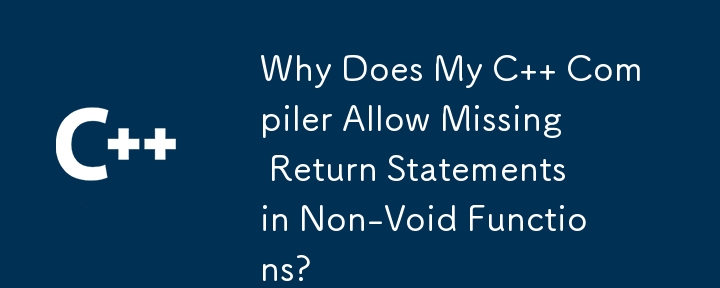

Omitting Return Statements in C : Undefined Behavior
A user stumbled upon unusual behavior with a version of g for Windows obtained through Strawberry Perl. They observed that the compiler allowed them to omit a return statement in a non-void function, which led to unexpected results.
Question:
Why did the compiler allow the omission of a return statement without issuing a warning? Does it make assumptions about returning the last-initialized variable?
Answer:
No, the compiler does not make assumptions or automatically return the last-initialized variable. Omitting a return statement in a non-void function is considered Undefined Behavior according to the ISO C -98 standard.
Explanation:
The C standard dictates that a return statement with an expression should only be used in functions that return a value. Flowing off the end of a function without a return statement is equivalent to returning no value, but this results in Undefined Behavior in functions that should return a value.
Consequences of Undefined Behavior:
Undefined Behavior is a hazardous situation where the behavior of the program becomes unpredictable. It can lead to unexpected results, runtime errors, memory corruption, or even system crashes.
Recommended Solution:
To avoid Undefined Behavior, it is crucial to explicitly include a return statement in all non-void functions, even if it means returning a default value. Additionally, enabling the -Wall compiler flag can help identify such issues during compilation.
Example:
Consider the following non-void function:
int func()
{
int a = 10;
// do something with 'a'
// omitted return statement
}Using the value of 'func()' in code is dangerous because the omitted return statement results in Undefined Behavior.
To rectify this, a return statement should be explicitly added:
int func()
{
int a = 10;
// do something with 'a'
return a; // return the appropriate value
}By adhering to these guidelines, programmers can avoid the pitfalls of Undefined Behavior and ensure the correctness and reliability of their C code.
The above is the detailed content of Why Does My C Compiler Allow Missing Return Statements in Non-Void Functions?. For more information, please follow other related articles on the PHP Chinese website!
 What is digital currency
What is digital currency
 How to open ESP files
How to open ESP files
 How to turn off real-time protection in Windows Security Center
How to turn off real-time protection in Windows Security Center
 What are the new features of Hongmeng OS 3.0?
What are the new features of Hongmeng OS 3.0?
 How to unlock oppo phone if I forgot password
How to unlock oppo phone if I forgot password
 How to solve the problem that localhost cannot be opened
How to solve the problem that localhost cannot be opened
 MySQL creates stored procedure
MySQL creates stored procedure
 How to buy and sell Bitcoin? Bitcoin Trading Tutorial
How to buy and sell Bitcoin? Bitcoin Trading Tutorial




